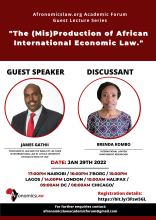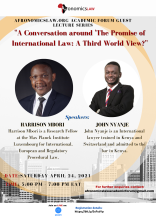TWAIL: Asserting Pride in Global South Epistemes through Critiquing the Silences of the Eurocentric Fantasies of the History of International Law (Part II)
It is terrifyingly sobering to consider that Hugo Grotius, historiographically considered, acting out a fundamentally TWAILian charge. Yes, he was not simply a young lawyer writing legal opinions. In fact, his point of view can be better appreciated when one considers that the supremely arrogant Treaty of Tordesillas had purported to share the world’s oceans between Spain and Portugal – Prof Anghie during the lecture chuckled at the ridiculous assertion of a certain property right to sea routes, once discovered. I dare say, the same will repeat with space routes in the not too distant future.

